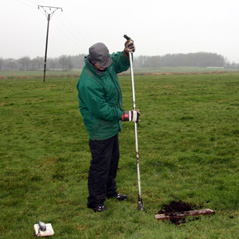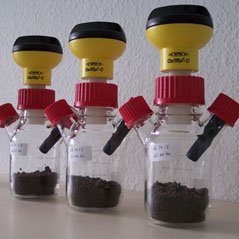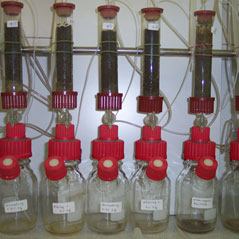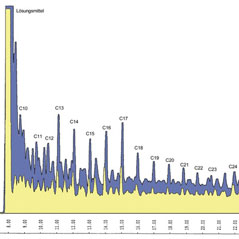Soil analyses and biodegradation tests
We offer all the required analyses for a chemical or microbiological assessment of solid samples and soils.1
In particular the following microbiological parameters can be examined:
Breathing activity and gas formation rate:
In soil and waste samples diverse biological processes occur. They are especially based on conversion of organic carbon. Aerobic respiration tests and anaerobic fermentation tests can be used to evaluate waste samples. The German standard tests for waste deposits form the basis for this evaluation process.
-
Respiration activity test (AT4) (in accordance with the Ordinance on Environmentally Compatible Storage of Waste)
- The respiration activity (AT4) assesses the potential of test material to be biologically decomposed under aerobic conditions. The oxygen consumption per unit of time (e.g 4 or 7 days) is determined in the process and compared with corresponding blank tests. The respiration activity is an important parameter in the waste deposit ordinance, for the treatment and deposit of mechanically and biologically pre-treated waste amongst other things.
- We measure the AT4 in batch test in accordance with the regulations of "Ordinance on Environmentally Compatible Storage of Waste from Human Settlements and on Biological Waste-Treatment Facilities" with the automatic measurement system OxiTop® (WTW).
-
Biogas potential test (Digester gas tests) (GB21)
- Similar to breathing activity under aerobic conditions, the biogas potential test permits a statement on the ability and dynamic of a sample to be biologically decomposed under anaerobic conditions. For this purpose the biological methane formation is automatically analysed over a period of 21 days under anaerobic conditions.
- This parameter is important for operators of biogas plants, for example. It provides the operator or substrate supplier with information on how much biogas can be produced from a defined substrate during fermentation process.
- The fermentation test is conducted on the basis of German “DIN* 38414 Part 8” (German standard methods for the examination of water, waste water and sludge). German standard tests on carrying out experiments can also be found in the “Ordinance on Environmentally Compatible Storage of Waste from Human Settlements and on Biological Waste-Treatment Facilities “and the VDI** Guideline 4630.
Compost maturity tests
- Composts must be regularly examined within the scope of the German RAL quality assurance system (RAL-GZ 251). The compost maturity (degree of rotting) is regulated in the German Compost Ordinance and provides information on the maturing of the substrate during the course of the composting process. The more mature a compost is, the less oxygen it consumes in a defined period.
- This measurement is carried out with the automatic measurement system OxiTop® (WTW). Measurement of the self-heating of the sample material in the Dewar container also provides information on the biological stability of the compost.
Biochemical oxygen demand - B.O.D. (DIN 38 409 H 51)
- The biochemical oxygen demand for n days (BODn) is usually determined during 5 days of incubation at 20°C. It represents the amount of oxygen needed for aerobic decomposing processes of organic substances by microorganisms. The BOD therefore provides information on the biologically recyclable part of organic substances contained in a sample.
- This measurement is conducted with the automatic measurement system OxiTop® (WTW)
Biodegradability of substances under defined conditions
- Determining the biodegradability of lubricants and related products in accordance with DIN* 51828-2.
- Investigation of substances for easy biological decomposition in accordance with the OECD guideline “Ready Biodegradability” (301):
- The methods are suitable for proving fast and complete biodegradtion under aerobic conditions. The testing substance becomes carbon dioxide, water and bio mass through microbial degradation process. The basis is the determination of unspecific parameters such as dissolved organic carbon, biological oxygen demand and carbon dioxide evolution.
- Investigation of substances for biodegradation potential in accordance with OECD Guideline “Inherent Biodegradability” (302):
- The method is suitable for investigating the inherent aerobic biodegradability of organic substances even in the case of restricted ability to decompose of the test substances. It is particularly useful for testing insoluble and/or volatile materials and based on the determination of the released organic carbon and the chemical oxygen demand.
- We conduct individual testing possibilities in percolation pillars, circulation apparatus and individual experimental structures going beyond the standard possibilities described.
1 partly in cooperation with other laboratories
*DIN - German institute for Standardization
**VDI - The Association of Germen Engineers




